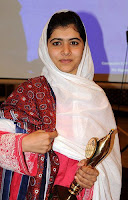
Malala Yousafzai (born 1998) is a student from the town of Mingora in Swat District, Khyber Pakhtoonkhwa, Pakistan, known for her civil right’s activism, especially in the field of women’s rights in the Swat Valley, where the Taliban regime has banned girls from attending school. In 2009, at the age of 10, Yousafzai came to prominence through a blog she wrote for the BBC, detailing her life under the Tehrik-i-Taliban regime and their attempts to take control of the valley, a confrontation which would later require the Pakistani military to intervene. Yousafzai has since been nominated for several awards, and has won Pakistan's first National Peace Prize.
On 9 October 2012, Yousafzai was shot in the head and neck in an assassination attempt by a Taliban gunman.
Named after Afghan queen Malalay, who was credited with routing the British in the second Anglo-Afghan war in 1878, 14-year old Malala Yousafzai achieved a feat no less.
Her resilience and courage helped rout the Taliban mindset that opposed female education in the Swat Valley.
Writing for the BBC
 Yousafzai rose to international fame for chronicling the plight of children for the BBC under the penname Gul Makai, during the Taliban insurgency years.
Yousafzai rose to international fame for chronicling the plight of children for the BBC under the penname Gul Makai, during the Taliban insurgency years.
“In 2008, when the Taliban imposed a ban on girls’ education in Swat, I floated an idea to publish a diary from any schoolgirl in Swat, to lend a human touch to the tragedy,” said Abdul Hai Kakar, a former BBC Urdu journalist in Peshawar.
“I contacted her father, Ziauddin, to find a girl who could write the diary for the BBC but he could not find anyone – everyone was afraid,” Kakar said.
“Ziauddin offered that his daughter can write, under her real name, but I gave her a pseudonym Gul Makai, for security reasons,” he added.
The blog, starting in late 2008, was published weekly.
“I had a terrible dream yesterday with military helicopters and the Taliban. I have had such dreams since the launch of the military operation in Swat. My mother made me breakfast and I went off to school. I was afraid going to school because the Taliban had issued an edict banning all girls from attending schools,” Gul Makai writes on January 3, 2009.
In November 2011, Yousafzai was nominated for International Children Peace Prize by Dutch organisation KidsRights. She did not receive the award, but the government of Pakistan decided to acknowledge her efforts, and awarded her the first-ever national Peace Award. The award was also named after her.
“Taliban were pushing Swat back to the stone age with attacks on female education,” she said.
“They simply did not want an educated society; educated mothers would not allow their children to turn into suicide bombers, and will not give away their jewelry to the militants in charity,” she said.
She narrated the tales of fear and prosecution had to go through under the Taliban.
“There was only fear,” she said, adding that one day, they were asked by the school administration to not wear the uniform, and hide their books beneath their shawls, so they may not invite militants’ attention.
She said the country needed leaders, and that she would go on to become a politician.
When asked what she wanted to say to the people of Swat, Yousafzai said, extremely candidly, that Swat’s people should not patronise any ‘mullahs’ in the future.















0 comments:
Post a Comment